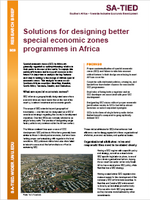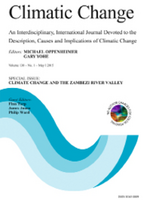Filter by...
Reset all
Publications (46)
Working Paper
pdf
– Evidence from forced resettlement in Zimbabwe
How does wartime victimization shape victims’ political attitudes in the long run? We argue that violence increases politics’ salience to victimized communities, which in turn increases these communities’ political awareness and evaluation of governance quality decades after war has ended. We...

Special economic zones (SEZ) in Africa are generally regarded as underperforming relative to their peers in the rest of the world. To explain this underperformance and to support success in the future it is important to analyse the key features and what is lacking in the design of African special...
Working Paper
pdf
Low levels of broadband penetration combined with poor quality of services present a challenge to growth and development in the Southern African Development Community (SADC). This paper performs a comparative analysis of the competitive dynamics of telecommunications markets in four SADC countries...
Working Paper
pdf
– The cases of Botswana, Kenya, Tanzania, and Zimbabwe
The objective of this research is to assess the extent to which export processing zones in Botswana, Kenya, Tanzania, and Zimbabwe integrate the Sustainable Development Goals in their implementation and operations. We focused on four Sustainable Development Goals—gender equality, decent work...
Working Paper
pdf
– Is success influenced by design attributes?
Special economic zones (SEZs) in Africa are generally regarded as underperforming relative to their peers in the rest of the world. This study focuses on the design features of the SEZ in Africa that may help explain this underperformance. Literature was reviewed to identify the key design...
Working Paper
pdf
Zimbabwe’s persistent economic challenges since the early 1990s have been largely attributed to unpopular political decisions at the expense of building productive capacity in different sectors of the economy. Using a global value chains framework taking into account political economy dynamics, this...
Working Paper
pdf
This paper documents the construction of a Social Accounting Matrix (SAM) for Zimbabwe in 2013. The SAM was built using National Accounts data from the Zimbabwe National Statistics Agency (ZIMSTAT), including balance of payment data, government finance data, and highly aggregated industry-level...
Journal Article
This peer-reviewed research is available free of charge. UNU-WIDER believes that research is a global public good and supports Open Access.
– Domestic policies, corporate strategies and regional dynamics
Part of Journal Special Issue
Regional Growth Opportunities
Journal Article
This peer-reviewed research is available free of charge. UNU-WIDER believes that research is a global public good and supports Open Access.
Part of Journal Special Issue
Regional Growth Opportunities
Journal Article
This peer-reviewed research is available free of charge. UNU-WIDER believes that research is a global public good and supports Open Access.
– Corporate strategies, investments and agro-industrial policies
Part of Journal Special Issue
Regional Growth Opportunities
Journal Article
This peer-reviewed research is available free of charge. UNU-WIDER believes that research is a global public good and supports Open Access.
Part of Journal Special Issue
Regional Growth Opportunities
Journal Special Issue
This peer-reviewed research is available free of charge. UNU-WIDER believes that research is a global public good and supports Open Access.
This issue contains seven articles addressing the major changes underway in the integration of economies in southern Africa. This special issue is based on the UNU-WIDER project 'Regional growth and development in Southern Africa'. This project aims to develop, in conjunction with important research...
Working Paper
pdf
– The case of four African countries
This paper investigates the levels and evolution of poverty in Malawi, Mozambique, Tanzania, and Zimbabwe using the decomposability properties of poverty measures based on a counting approach. We compare poverty measures such as the Alkire and Foster index with alternative poverty indices that are...
Working Paper
pdf
Since 2000, Zimbabwe has been under some pressure to provide more fully for its children. It is not clear whether child poverty has worsened, although AIDS, drought, and economic mismanagement have all compromised poverty reduction. In any case, child poverty has come under increased scrutiny, in...
Working Paper
pdf
– Competition in road transportation of perishable goods between Malawi, South Africa, Zambia, and Zimbabwe
Rapid urbanization and rising income levels in Southern Africa have increased the consumption of perishable and processed food products. This paper relies primarily on firm-level interview data to assess competition and bottlenecks in transporting time-sensitive perishable products across borders...
Working Paper
pdf
– Competition in road transportation between Malawi, Mozambique, South Africa, Zambia, and Zimbabwe
Efficient transport links are critical to enhancing the integration of markets in Southern Africa. This paper assesses the structure of markets, competition, and prices and costs of road transportation between urban hubs in Malawi, Mozambique, South Africa, Zambia, and Zimbabwe. Key findings are...
– Regional integration in southern Africa through supermarkets
Walk into any supermarket and you will find a mix of products to stock the kitchen. It’s easy to assume that many of the goods on offer are sourced locally and from nearby countries. In the region of southern Africa, however, imported goods are often shipped from another continent instead of...
Working Paper
pdf
– The case of the animal feed to poultry value chain
This paper considers findings of studies analysing the development of a regional animal feed to poultry value chain in southern Africa (Botswana, South Africa, Zambia, Zimbabwe). The southern African regional poultry value chain is underdeveloped, although important changes include investments by...
Working Paper
pdf
– A comparison of findings from South Africa, Botswana, Zambia, and Zimbabwe
Since the early 2000s, there has been rapid growth in the number and spread of supermarkets in southern Africa. This paper is a synthesis of key findings of studies undertaken in Botswana, South Africa, Zambia, and Zimbabwe on the expansion of supermarkets and the impact this has had on suppliers...
Research Brief
pdf
– The animal-feed-to-poultry value chain
15-20% of local demand for poultry in South Africa is met by imports Evidence from Zambia suggests that capital investments in the value chain can increase local production Increased demand due to growing urban populations poses critical challenges for local industrialization in southern Africa...
Blog
The UNU-WIDER project on extractives for development seeks to examine how poor and middle-income countries can best use their natural resource wealth to promote development. It is well understood that minerals, metals, oil or gas (collectively known as ‘extractives’) have for some years been...
Working Paper
pdf
– National trajectories and regional integration
This paper explores the linkages between the national systems of innovation of Botswana, South Africa, Zambia, and Zimbabwe and their respective mineral extraction and mineral processing value chains, including input industries. Our analysis reveals four individual national systems of innovation...
Working Paper
pdf
– A comparative analysis of policy frameworks in three Southern African countries
This paper explores the potential to leverage large-scale mineral extraction in Botswana, Zambia, and Zimbabwe to foster mineral beneficiation and upstream industries. The evidence suggests that the success or failure of a resource-based industrialization approach is country and sector specific...
Working Paper
pdf
The animal feed to poultry value chain in the southern African region has seen rapid demand growth owing to increases in urbanization. This growth has been accompanied by the increase in co-ordinated investments by large, predominantly South African, firms across the region. We examine the...
Journal Article
This peer-reviewed research is available free of charge. UNU-WIDER believes that research is a global public good and supports Open Access.
– Zambezi basin and South Africa
Part of Journal Special Issue
Prospects for Renewable Energy in Africa
Working Paper
pdf
– Changing models of retailing and the implications for local supplier capabilities in South Africa, Botswana, Zambia, and Zimbabwe
Over the past two decades, southern African countries have experienced rapid growth in the number and spread of supermarkets. Several factors have been attributed to this growth, including increasing urbanization, increased per capita income, the rise of the middle class, economies of scale and...

The articles in this special issue set forth a set of technical contributions that will improve the understanding of the impacts of climate change in developing countries. They are drawn from the Development Under Climate Change (DUCC) project carried out by UNU-WIDER of which the countries of the...
Working Paper
pdf
China’s importance as a major donor outside the traditional Western donors has been increasing and this has helped to bridge the funding gaps in developing countries. At the same time, South-South financial assistance still comes with less conditionality making China’s aid model different to Western...
Book Chapter
From the book:
Vulnerability in Developing Countries
Working Paper
pdf
This paper uses five life histories from three locations in Zimbabwe—one peri-urban, one urban and one rural—to provide a window on current processes of impoverishment and adverse coping. Each case and location highlight key aspects of Zimbabwe’s recent economic and political turmoil. Together the...
Working Paper
pdf
– A Consideration of Evidence from Southern Africa
The paper considers the impact of livelihoods oriented agricultural service provision for smallholder farmers on gender relationships and food security. The paper contents that the democratization and liberalization of agricultural services towards participatory, bottom-up approaches, from the early...
Working Paper
pdf
– Evidence from Zimbabwe
Using data from a 2004 household-based survey of children, we examine differences between boys and girls in self reports of food insecurity in Zimbabwe. Previous studies have taken only the views of the household head into consideration in categorizing the food insecurity status of the household. By...
Displaying 32 of 46 results
 Join the network
Join the network